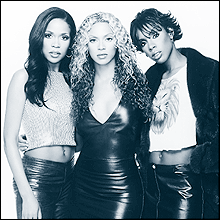![[Sidebar]](/standard/image/sidebar.gif)
![[Music Reviews]](/standard/image/headers/music_reviews_header.gif)
| clubs by night | club directory | bands in town | concerts | hot links | reviews & features |
Commercial breaks
Destiny's Child and Eden's Crush
by Carly Carioli
Destiny's Child
Destiny's Child are right now the most highly evolved group working in black pop -- which is in turn the most accessible, expressive, forward-thinking, vibrant genre on the radio. When you heard, for instance, "Say My Name," you heard not only a sophisticated piece of songwriting and a fresh palette of skittering, propulsive sounds, you also heard sophisticated storytelling, the song's taut, modulated cat-and-mouse game of deceit and recrimination as contemporary and polished as anything out of the burgeoning black pop-lit scene that's produced Valerie Wilson Wesley's Ain't Nobody's Business If I Do and Eric Jerome Dickey's Cheaters. DC3's new hit "Survivor" revives Gloria Gaynor's Darwinian notion of success as less a victory of self-invention than a hard-won battle against an array of forces set in motion to unmake you. Which is a fantastic and resonant story, and great stories -- as they have been since the '60s -- are as much a driving currency of black pop as great songs and singers.That said, there is a dearth of great stories, though not of great songs, on Destiny's Child's new Survivor (Columbia) -- something that's been made conspicuous by the variety of tales being heard in between DC3 singles on the radio. The week before the release of Survivor, the #1 R&B song in the country was City High's "What Would You Do?," another remarkably sophisticated song about a very different kind of inner-city survivor: a post-welfare single mother who sells her body to feed her child.
"What Would You Do?" is an untidy reminder of fluctuating urban fortunes, and it would be unfair to blame Destiny's Child for not reminding us of it. DC3, after all, are bravely middle-class. They bespeak a dawning sense of economic self-sufficiency, an accompanying expansion of social possibilities encoded in bold female-lensed fantasies of sexual freedom, and the luxury of a deep moral ambiguity, as their club hit "Jumpin' Jumpin'," a celebration of compartmentalized infidelity, and their featured appearance at the George W. Bush inaugural both attest.
Perhaps that juxtaposition isn't as incongruous as it sounds: Survivor is first and foremost a well-deserved victory lap and second an exercise in icon making. On the disc's cover, a picture of the three suffices in lieu of their name or the title. They've whittled down the variety of their appeal to a couple of bullet points: their durable self-sufficiency ("Independent Women Part One," "Survivor") and, not unrelated, their enormous desirability ("Bootylicious"). It's hard to deny the sheer power of their charisma, their bushel of new hooks, or their unparalleled vocal prowess. Beyoncé Knowles, the group's central superstar diva-in-training, is by turns flattered and challenged: she soars through the easy ethereal bubblegum of "Happy Face" and eats up the hard, dissonant, avant-funk of "Sexy Daddy," even if on the latter the group seem to be following their imitators (in this case 3LW) instead of blazing the trail. The Writing's on the Wall produced four chart-smashing singles; a week into its release, Survivor is already working on its third.
Without any devastating loss of quality, Beyoncé has sent the high-profile trackmasters packing and produced most of the disc herself -- a decision that likely has less to do with statements of independence than with, well, royalty statements. The dubious commandment that performers ought not to enlist the collaborative assistance of other songwriting professionals is a rock-and-roll trope with which the neo-capitalist heroes of hip-hop and R&B remain refreshingly unencumbered. If DC3 want to go it alone for the money's sake, fine, but for beat's sake, bring on the remixes.
The only offputting aspect of Survivor might be its creeping piousness -- which, in DC3's defense, is practically mandatory for any mega-star group these days. Survivor's gospel medley could've been edgier given an era in which, thanks to Kirk Franklin, even God knows how to bounce. And though on "Nasty Girl" and "Fancy" the girls appoint themselves the arbiters of decency, both tracks find them returning to the confrontational, conversational directness that, in lieu of anything quite so compellingly narrative as "Say My Name," has become such a staple of their appeal.
After all, stories can be bought. And Eden's Crush -- whose formation is chronicled on the WB reality-TV soap opera Popstars -- may represent the triumph of story over song. At the very least, it's difficult to tell whether the 77,000 people who bought a copy of EC's single "Get Over Yourself" on the first week it was available -- it was offered for sale by 800 number following the episode in which the group recorded it -- were buying a piece of the story or the whole of a song. "Get Over Yourself" certainly has very little of the latter; the series uses as its calling card a four-second snippet culled from the track's opening, and it's the catchiest moment on the group's Popstars CD. But that four-second hook is never repeated in "Get Over Yourself"; to hear it again, you have to replay the song or else tune into the WB right before the commercial break.
| home page | what's new | search | about the phoenix | feedback |
Copyright © 2000 The Phoenix Media/Communications Group. All rights reserved.
